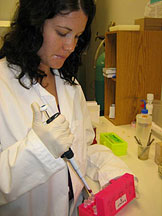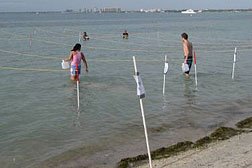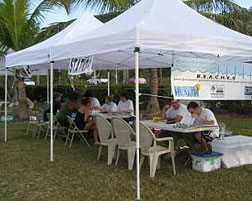 |
|||||||||
skip to content |
|||||||||
NOAA helps keep south Florida beach goers “in the know” when it comes to their health

An EPA intern processes samples at the AOML Environmental Microbiology Lab
Beaches are a popular destination for local Floridians and vacationers alike in the Miami area. To insure the good water quality at these recreational destinations they are tested regularly for levels of bacteria. These tests are carried out by the Florida Department of Health in an effort to detect when beach water may pose a health risk. NOAA’s Atlantic Oceanographic and Meteorological Laboratory (AOML) Environmental Microbiology Lab plays an active role in collaboration with the EPA and the University of Miami to increase our ability to identify when beach water may contain disease causing pathogens, and which pathogens are most likely to cause illness.
The program, nicknamed BEACHES, is a study of the incidence of common water borne diseases that typical bathers may contract while at the beach. Examples include gastro-intestinal illness, eye and ear infections, and skin irritations and rashes. The location of the study includes a popular Miami beach (Hobie Cat Beach on the Rickenbacker Causeway), conducted by the University of Miami Oceans and Human Health Center in collaboration with NOAA AOML, the Florida Department of Health, and a variety of other investigators from public and private institutions around the state.

Study participants wade out in marked lanes, conduct exposure activities as directed (dunk head, etc.) and fill their individual 5L exposure sample bottles.

Participants provide medical interviews before exposure and 1 week after exposure.

Hobie Cat Beach, the site of the beaches study
After a baseline health assessment, study participants spend about one hour at the beach either sitting on the sand as a control group or swimming in the water as a test group. Samples are taken of the beach water for analysis. The general health of the participants is then recorded one week later. The goal of the program is to determine linkages between any ailments and elevated levels of bacteria that tend to indicate disease causing microbes.
NOAA AOML’s Environmental Microbiology Lab conducts assessments of the microbes in the recreational waters and beach sand, using EPA standard methods for identifying bacteria that tend to be present when there is fecal contamination. Such EPA standard tests identify bacteria that indicate the possible presence of pathogens as opposed to measuring the actual disease-causing pathogens. In addition to these tests, the program is also using new assays developed in labs like AOML that use molecular microbial source tracking to be able to specifically identify the disease causing pathogens as well as the source of the pathogens, such as dog, bird, or human waste.
The BEACHES program is an on-going study aimed at comparing the actual incidence of disease along-side the EPA bacterial indicators and newly developed molecular assays. Field sampling for this study is expected to be completed by the end of summer 2008. AOML hopes to increase the ability for natural resource managers to more accurately assess the levels of non-point source pollution and thereby reduce the incidence of bather illness.
*Erica Rule is a science writer and outreach specialist at AOML.
The Atlantic Oceanographic and Meteorological Laboratory (AOML) conducts basic and applied research in oceanography, tropical meteorology, atmospheric and oceanic chemistry, and acoustics. The research seeks to understand the physical characteristics and processes of the ocean and the atmosphere, both separately and as a coupled system. AOML is one of NOAA's research laboratories. |
8/25/08
CLIMATE · OCEANS, GREAT LAKES, and COASTS · WEATHER
and AIR QUALITY
ABOUT US · RESEARCH
PROGRAMS · EDUCATION · HOME